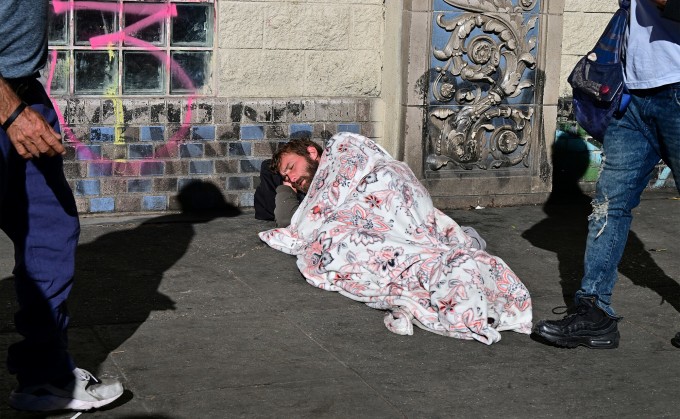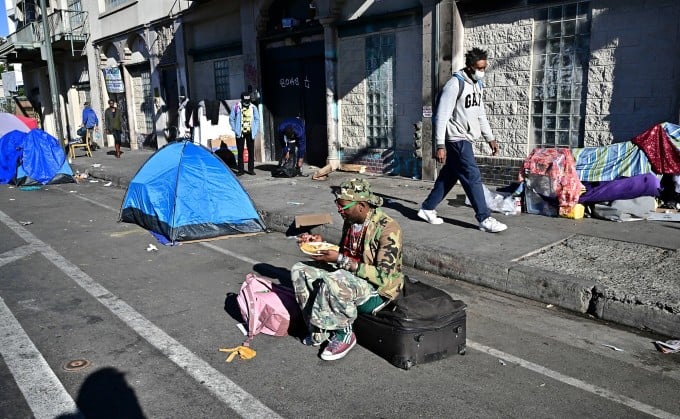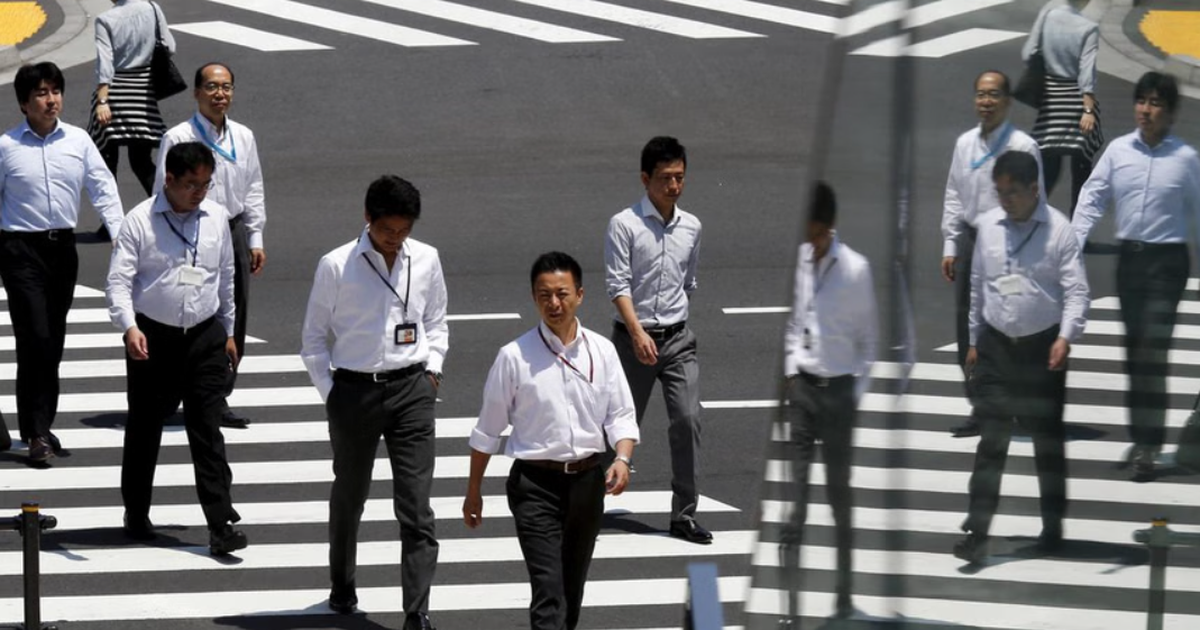American Carlos Schmidt had nothing but a backpack and an old blanket, like thousands of homeless people in one of the richest cities in the world.
"At night, I find a quiet place like a park or a bus stop where there is no noise," said the 37-year-old. "I try to rest there as long as possible."
Schmidt is one of 75,000 homeless people living on the streets of Los Angeles and its suburbs, according to a January survey. That number has increased 70% since 2015 in a city where income inequality is glaring.

A homeless man sleeps on the sidewalk in Los Angeles, California, November 22. Photo: AFP
The wealthy drive luxury sports cars, dine at $1,000-a-meal restaurants, and visit members-only nightclubs. On the same streets, men and women cower in hunger. More than half suffer from mental health or addiction issues.
In addition to Los Angeles, this scene also exists in many cities such as San Francisco, Sacramento and San Diego, major California cities that are home to one-third of the homeless people in the US.
The causes of homelessness are varied and complex, including addiction, illness, family breakdown and debt. But a key factor in California is the real estate market, where multimillion-dollar homes exist and the average rent for a studio apartment in Los Angeles is $1,700 a month.
That’s what landed Schmidt on the streets two years ago. Unable to pay his rent, he slept with friends until he couldn’t afford it anymore. The $400 a week he made cleaning wasn’t enough to cover rent. After a few weeks in hotels, he’d run out of savings.
"I tried. But everything is too expensive. The most expensive is food," he said.
The stress of sleeping rough led to Schmidt becoming depressed, using drugs and eventually losing his job. “Sometimes it’s easier to give up. I chose to give up,” he said.
The sight of ramshackle shacks crowding sidewalks is common in Los Angeles. They can be found on Hollywood Boulevard, the streets of Venice Beach and under freeway overpasses.
The issue came up during last year's mayoral election, with Karen Bass, the winner, declaring a state of emergency regarding homelessness in her first days in office.
The Democratic mayor wants to end policies that don't address the root of the problem, like clearing out homeless encampments only to have them pop up again a few blocks away.
In the past 12 months, the city has demolished 32 encampments and provided housing for residents. It claims to have placed 21,600 people in shelters like homeless hotels. The mayor has also eliminated some of the bureaucratic red tape that slowed housing construction.
“Dealing with this crisis is like peeling an onion,” Bass said. “When you peel an onion, you cry. Every time we take a step forward, we hit a barrier and have to break that barrier.”
Mayor Bass on Dec. 6 inspected the sidewalk in front of a Hollywood school where 40 homeless people slept more than a year ago. Their tent encampment is gone, but three blocks away, dozens of ramshackle tents line Sunset Boulevard.
The task facing Bass and her administration is vast and complex, with dozens of people becoming homeless every day. The city is already expensive, and the pressure of global inflation is getting worse. Tens of thousands of renters face losing their homes. During Covid-19, the government had issued an order preventing landlords from evicting renters who failed to pay on time, but that order has since expired.
The mayor's initial pledge to provide six months' housing to all those in need of emergency accommodation was not possible because "temporary housing only really makes sense if the stay is for a year and a half to two years".

Tents, blankets, and clothes of homeless people are spread across a street in Los Angeles on November 22. Photo: AFP
After nine months in the hotel, Jaquies Manson returned to his tent on the sidewalk of Venice Beach. Manson had served time in prison for drug trafficking but had been clean for five years. But the hotel’s rules, which prohibited overnight visitors, were too much.
“I’m 52 years old,” he said. “I don’t need someone knocking on my door at 6 a.m. every day to check if there’s someone else in the room.”
He was paralyzed on his left side due to a stroke, unable to find work and receiving $1,000 in monthly disability benefits, which Manson said was not enough.
“I can find a shabby room for $900. But how am I going to live on the remaining $100 a month?” Manson said.
Hong Hanh (According to AFP )
Source link

































![[Photo] "Beauties" participate in the parade rehearsal at Bien Hoa airport](https://vstatic.vietnam.vn/vietnam/resource/IMAGE/2025/4/11/155502af3384431e918de0e2e585d13a)
































































Comment (0)